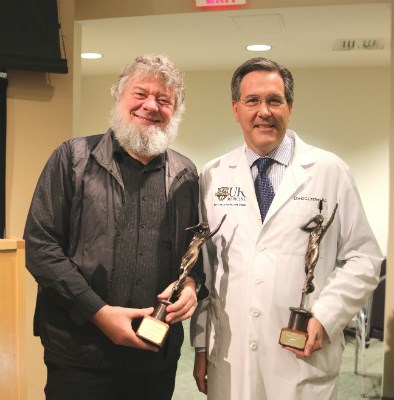Research Led by Hucky Land Points to Prostate Cancer Tool
Tuesday, December 20, 2016
Researchers from Wilmot Cancer Institute and Roswell Park Cancer Institute in Buffalo reported in the journal Oncotarget that they have discovered a possible new tool for predicting whether prostate cancer will reoccur following surgery based on the expression patterns of four genes.
The Wilmot/Roswell Park tool was able to predict recurrence, based on human tissue samples and known patient outcomes, with 83 percent accuracy. Currently the only other way to estimate tumor aggressiveness is with a Gleason score, a grading system for prostate tumors that has limited power in most cases, researchers said.
Some prostate cancers grow very slowly, and when the disease is detected early, the five-year survival rates are nearly 100 percent. However, some men are diagnosed with more aggressive localized disease and, even after having a radical prostatectomy, cancer will return in one-third of patients.
“Our study sought to improve upon the prediction tools used in these types of cases so that oncologists would know with more certainty when to recommend additional treatment, such as radiotherapy, immediately after surgery,” said Hucky Land, Ph.D., director of research at Wilmot and the Robert and Dorothy Markin Chair of the Department of Biomedical Genetics, who led the research. (Most patients receive no further treatment after surgery.)
Earlier, Land’s lab discovered a large group of non-mutated genes that are actively involved in cancer development. After analyzing expression of this gene set in frozen prostate cancer tissue samples, researchers discovered the four-gene signature, which was expressed differently in prostate cancer that later returned. Justin Komisarof, an M.D./Ph.D. student in the Land lab, developed the various algorithms and methods to evaluate the gene signature. The research team concluded that their tool outperformed other scientific methods, and they have applied for a U.S. patent.
The National Institutes of Health and Wilmot Cancer Institute/Roswell Park Cancer Institute Collaboration Pilot Funds supported the research. Chief collaborators from Roswell Park include Carl Morrison, M.D., executive director of the Center for Personalized Medicine, and James Mohler, M.D., associate director and senior vice president for translational research at Roswell.
Wilmot Co-directors Honored with Davey Award
Tuesday, November 15, 2016

Hartmut “Hucky” Land, Ph.D. (left) and David C. Linehan, M.D.
Wilmot Cancer Institute’s co-directors Hartmut “Hucky” Land, Ph.D., and David C. Linehan, M.D., were recognized recently with the Davey Award, an honor bestowed on University of Rochester faculty members who have made outstanding contributions to cancer research.
They received their awards at the 21st annual Wilmot Scientific Symposium Nov. 10. The award for Land, who organizes the annual symposium, was a surprise orchestrated by Jonathan W. Friedberg, M.D., M.M.Sc., director of Wilmot Cancer Institute.
At the symposium, Land presented the planned Davey Award to Linehan, who is also Wilmot’s director of clinical operations and the Seymour I. Schwartz Professor and Chairman of Surgery. Linehan was recognized for his work studying the role of the tumor microenvironment in promoting treatment resistance in pancreatic cancer.
Before his lecture, Linehan presented Land the surprise award with a recorded video message from Friedberg. Land, who is also Wilmot’s director of research and the Robert and Dorothy Markin Professor of Biomedical Genetics, was recognized for his body of work and for his work studying the genetic programs that control all of cancer’s worst shared features — such as a cancer cell’s ability to quickly divide and survive despite aggressive treatment.
Wilmot Scientists Exploit Cell Metabolism to Attack Cancer
Wednesday, October 12, 2016
Cancer cells have their own unique ways of reproducing, involving a shrewd metabolic reprograming that has been observed in virtually all types of cancer but not in normal cells. Now, University of Rochester Medical Center scientists have pinpointed one key source of the problem, which could lead to new treatment opportunities.
In an article published by Cell Reports, the scientific team shows for the first time how cancer-causing mutations control and alter the way cancer cells biosynthesize and replicate.
The discovery is the result of a close collaboration between the laboratories of Joshua Munger, Ph.D., associate professor of Biochemistry and Biophysics, and Hucky Land, Ph.D., the Robert and Dorothy Markin Professor and Chair of Biomedical Genetics and director of research at the URMC’s Wilmot Cancer Institute.
“Every tissue or cell type in the body has different metabolic needs but as cells become cancerous their metabolism shifts in ways that are very different from normal cells,” Munger said. “Being able to identify those differences is critical for developing treatment targets.”